
DEVELOPMENTAL AND COMPARATIVE IMMUNOLOGY
Scope & Guideline
Decoding Immunity: From Development to Diversity.
Introduction
Aims and Scopes
- Comparative Immunology:
The journal emphasizes comparative studies of immune systems across different species, including invertebrates, fish, amphibians, and mammals, to understand evolutionary adaptations and functional diversity. - Developmental Immunology:
Research focusing on the development of immune responses, particularly how immune systems evolve and function from embryonic stages through adulthood in various organisms. - Molecular Characterization of Immune Components:
The journal publishes studies that detail the molecular mechanisms underlying immune responses, including the characterization of cytokines, receptors, and signaling pathways. - Innate and Adaptive Immunity:
Research on both innate and adaptive immune responses, exploring how these systems interact and contribute to overall health and disease resistance. - Pathogen-Host Interactions:
Studies investigating the interactions between immune systems and pathogens, including viral, bacterial, and parasitic infections, and how these interactions inform immune defense strategies. - Environmental and Stress Factors on Immunity:
Research examining how environmental changes, stressors, and nutritional factors affect immune responses, resilience, and disease susceptibility in various species.
Trending and Emerging
- Microbiome Interactions with Immunity:
An increasing number of studies are focusing on the interplay between the microbiome and immune responses, highlighting how gut microbiota influence immunity and disease resistance in various organisms. - Advanced Techniques in Immunology:
The integration of advanced methodologies, such as CRISPR/Cas9 gene editing and high-throughput sequencing, is becoming more prevalent, enabling researchers to explore immune functions at unprecedented resolutions. - Functional Genomics and Proteomics:
Research utilizing genomic and proteomic approaches to dissect immune-related pathways and responses is on the rise, reflecting a trend toward understanding the molecular underpinnings of immunity. - Climate Change Effects on Immunity:
Emerging studies are investigating how climate change impacts immune responses, particularly in aquatic species, as environmental stressors become increasingly relevant to immunological research. - Immunotherapy and Vaccine Development:
Research focusing on novel immunotherapeutic approaches and vaccine development, particularly in aquaculture and veterinary medicine, is gaining momentum, driven by the need for effective disease management strategies.
Declining or Waning
- Invertebrate Immunology:
Although still relevant, the volume of research focusing specifically on invertebrate immune systems has decreased compared to prior years, possibly due to a shift towards vertebrate models and their more complex immune systems. - Historical Perspectives on Immunology:
Papers that delve into historical or retrospective analyses of immunological concepts and methods have become less common, as current research tends to emphasize novel findings and cutting-edge techniques. - Basic Immune Mechanisms:
There appears to be a decline in studies solely focused on fundamental immune mechanisms without direct application to current health issues or evolutionary implications, as researchers increasingly seek translational relevance. - Single Organism Studies:
Research centered on a single species without comparative analysis is waning, as there is a growing preference for studies that provide broader insights across multiple species.
Similar Journals

IMMUNOLOGY AND CELL BIOLOGY
Pioneering Research in Immune and Cellular BiologyIMUNOLOGY AND CELL BIOLOGY, published by Wiley, serves as a prominent platform for disseminating cutting-edge research in the fields of immunology and cell biology. With an ISSN of 0818-9641 and an E-ISSN of 1440-1711, this journal has established itself since its inception in 1987, demonstrating a commitment to advancing knowledge in its disciplines through high-quality articles. Renowned for its rigorous peer-review process, it holds a Q2 quartile ranking in both immunology and cell biology categories as of 2023, showing its competitive stature in these fields. IMUNOLOGY AND CELL BIOLOGY is indexed among the elite journals worldwide, with impressive Scopus rankings, including a rank of #75/233 in Immunology and Allergy. The journal’s comprehensive scope ensures that it caters to an audience of researchers, professionals, and students who are dedicated to exploring the intricate mechanisms of immune responses and cellular interactions. Although it does not operate under an open access model, its subscription-based content remains invaluable for those seeking to broaden their understanding of immunology and cell biology. By providing a forum for significant scientific dialogue, IMUNOLOGY AND CELL BIOLOGY continues to shape the future of research in these vital areas.
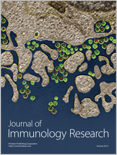
Journal of Immunology Research
Connecting Researchers: Elevating the Study of Immunology WorldwideJournal of Immunology Research, published by HINDAWI LTD, stands as a pivotal open-access journal in the realm of immunology, with a particular emphasis on advancing knowledge in both fundamental and applied aspects of the field. Since its inception in 1990, the journal has committed to the dissemination of high-quality research, earning a respectable impact factor that reflects its significance. Based in Egypt, it provides a platform for researchers from around the world, showcasing innovative studies and reviews that contribute to the understanding of immune system mechanisms. Its 2023 rankings place it in the Q2 category for Immunology and Allergy, and Q1 in the broader category of Medicine (miscellaneous), indicating a strong reputation among its peers. Through its open-access model, the journal promotes wide accessibility of cutting-edge research, catering to researchers, professionals, and students alike. With ambitions that converge through 2024, the Journal of Immunology Research continues to be an essential resource for those seeking to explore the forefront of immunological science.
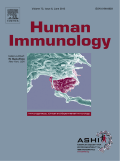
HUMAN IMMUNOLOGY
Fostering Knowledge in Immune Health and DiseaseHUMAN IMMUNOLOGY, published by Elsevier Science Inc, serves as a critical platform for disseminating research in the fields of immunology and allergy, as well as various aspects of miscellaneous medicine since its inception in 1980. With an ISSN of 0198-8859 and E-ISSN 1879-1166, this journal is pivotal for researchers and practitioners looking to advance their understanding of human immune responses and related conditions. The journal currently holds a respectable position within its field, as highlighted by its 2023 Scopus ranks—#114/233 in Immunology and Allergy and #132/236 in Immunology and Microbiology. Moreover, it maintains a Q2 quartile ranking in both Immunology and Allergy and miscellaneous Medicine, underscoring its influence and reach within the scientific community. Although it does not currently offer Open Access options, HUMAN IMMUNOLOGY remains dedicated to providing valuable insights and fostering academic discourse within its discipline, characterized by a rigorous peer-review process and a focus on innovative research trajectories.
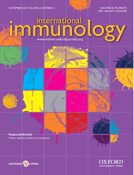
INTERNATIONAL IMMUNOLOGY
Unveiling Innovations in Immunology for Global Impact.INTERNATIONAL IMMUNOLOGY, published by OXFORD UNIV PRESS, stands out as a premier journal in the field of immunology, providing a vital platform for disseminating groundbreaking research and innovative developments within the discipline. With an impressive Q1 ranking in Immunology and Allergy, as well as in Medicine (miscellaneous), it consistently showcases high-impact studies that contribute to the advancement of immunological knowledge. The journal spans over three decades, from its inception in 1989 to its ongoing contributions as of 2024, thus solidifying its reputation in the scientific community. Researchers, professionals, and students will find valuable articles that delve into the complexities of immune responses, therapeutic interventions, and emerging immunological paradigms, ensuring INTERNATIONAL IMMUNOLOGY remains at the forefront of knowledge in the life sciences.
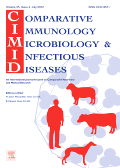
COMPARATIVE IMMUNOLOGY MICROBIOLOGY AND INFECTIOUS DISEASES
Exploring Host-Pathogen Dynamics for Global HealthComparative Immunology Microbiology and Infectious Diseases, published by Elsevier Science Ltd, is a prominent journal dedicated to advancing the fields of immunology, microbiology, infectious diseases, and veterinary sciences. Established in 1978, this journal has become a vital resource for researchers and professionals alike, with a commendable impact factor that reflects its significance in academia. The journal, available in both print and electronic formats (ISSN: 0147-9571, E-ISSN: 1878-1667), stands out for its commitment to disseminating innovative research findings, particularly through its categorization in Q2 and Q3 quartiles across various related disciplines as of 2023. The journal aims to provide insightful comparative analyses that enhance our understanding of host-pathogen interactions, immune responses, and disease manifestations. With a global readership base, it serves as a platform for collaborative discourse among scientists and professionals, ultimately contributing to the improvement of health outcomes worldwide.
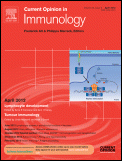
CURRENT OPINION IN IMMUNOLOGY
Connecting Scholars in the World of ImmunologyCURRENT OPINION IN IMMUNOLOGY is a prestigious journal dedicated to the dynamic field of immunology, published by CURRENT BIOLOGY LTD in the United Kingdom. With an ISSN of 0952-7915 and an E-ISSN of 1879-0372, this journal has been a cornerstone of scholarly communication since its inception in 1988 and continues to disseminate cutting-edge research and reviews aimed at advancing our understanding of immune responses. Holding a remarkable Q1 ranking in both Immunology and Allergy categories for 2023, it ranks impressively within the top percentiles in its field, securing 27th233 in Immunology and Allergy and 31st out of 236 in Immunology and Microbiology. Emphasizing high-impact research, the journal provides researchers, professionals, and students with valuable insights into emerging trends and critical developments. As a vital resource in immunological research, it serves as a platform for disseminating innovative findings, fostering collaboration, and enhancing scholarly exchange in a rapidly evolving scientific landscape.
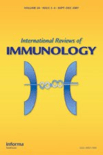
INTERNATIONAL REVIEWS OF IMMUNOLOGY
Fostering Breakthroughs in Immunological UnderstandingINTERNATIONAL REVIEWS OF IMMUNOLOGY, published by Taylor & Francis Inc, is a leading academic journal that has been a cornerstone of immunological research since its inception in 1986. With an impressive impact factor and ranked in the top quartiles of its field (Q2 in both Immunology and Allergy), this journal offers a critical platform for the dissemination of influential findings and advancements within immunology. Spanning a diverse array of topics, from basic immune mechanisms to clinical applications, it aims to support the global scientific community in enhancing immunological understanding and therapeutic interventions. Researchers and professionals alike benefit from insights provided by renowned contributors, ensuring that the journal remains relevant in a rapidly evolving field. Directly accessible through subscription or institutional access, INTERNATIONAL REVIEWS OF IMMUNOLOGY is committed to fostering collaboration and innovation, making it an essential resource for anyone involved in immunological research and practice.

Mucosal Immunology
Transforming Understanding of Mucosal SystemsMucosal Immunology, published by Elsevier Science Inc, is a leading journal dedicated to advancing the field of immunology with a particular focus on mucosal immunity. Since its inception in 2008, the journal has established itself as a premier source of cutting-edge research, evidenced by its impressive Q1 ranking in both Immunology and Allergy for 2023, and its notable positions within the top ranks of Scopus (Rank #21/233 in Immunology and Allergy and Rank #24/236 in Immunology and Microbiology). The journal serves as a vital resource for researchers, professionals, and students aiming to explore the complexities of mucosal immune responses and their implications in health and disease. While it operates under a subscription model, Mucosal Immunology is committed to disseminating quality research globally and enhancing collaborative efforts within the scientific community. Explore the latest findings and connect with influential scholarship in this rapidly evolving field.
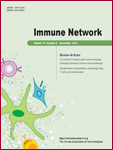
Immune Network
Leading the Charge in Immunological DiscoveriesImmune Network is a prestigious journal dedicated to disseminating high-quality research in the field of immunology, infectious diseases, and allergy, under the esteemed KOREA ASSOCIATION OF IMMUNOLOGISTS. Founded in 2016, this journal has quickly ascended to a top-tier publication, achieving Q1 rankings in 2023 in multiple relevant categories, including Immunology, Allergy, and Infectious Diseases. With a strong emphasis on innovation and interdisciplinary research, Immune Network appeals to a diverse audience of researchers, professionals, and students keen on advancing the understanding of immune responses and disease mechanisms. However, it is crucial to note that the journal operates under a subscription model without open-access provisions. Its impact factor further solidifies its reputation, reflecting the significant influence of the articles published. Located in South Korea, the journal serves as a global platform for sharing revolutionary insights and fostering collaborations within the immunology community.

CLINICAL IMMUNOLOGY
Exploring the Depths of Immune ResponsesCLINICAL IMMUNOLOGY is a premier academic journal dedicated to the field of immunology, published by Academic Press Inc. Elsevier Science. With a robust impact reflected in its recent categorization as Q2 in Immunology and Q1 in Immunology and Allergy for 2023, this journal stands out as a key resource for researchers and professionals alike. Featuring a diverse array of articles from fundamental laboratory studies to advanced clinical applications, CLINICAL IMMUNOLOGY aims to disseminate significant research findings that contribute to the evolving landscape of immunological science. Its notable Scopus rankings underscore its esteemed position, with ranks of #33 and #36 in the respective categories, highlighting its commitment to high-quality scholarly work. Although not an open-access journal, it ensures access to valuable insights and developments in the immune response and related fields, making it an indispensable tool for students and professionals aiming to stay at the forefront of immunological research.